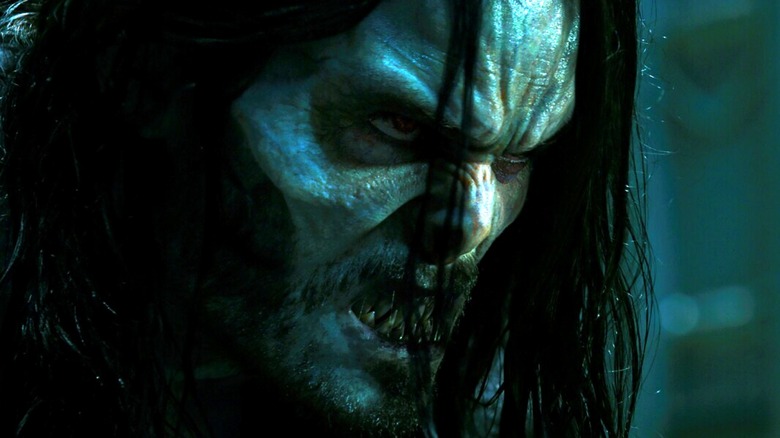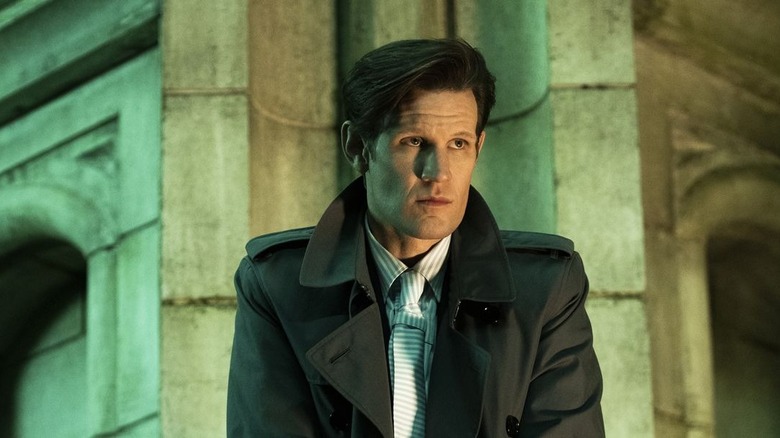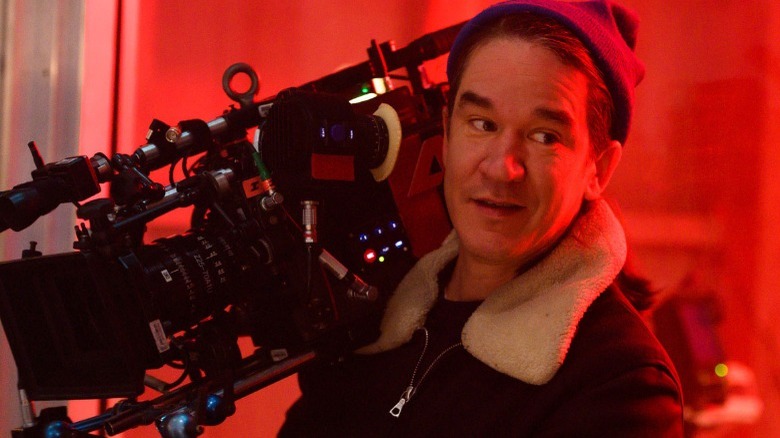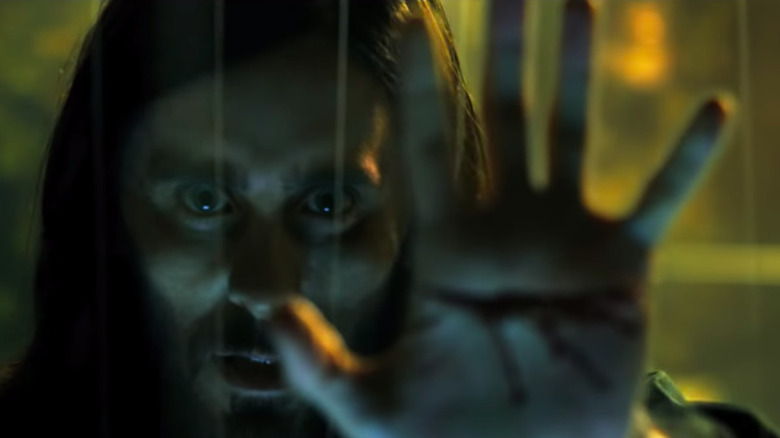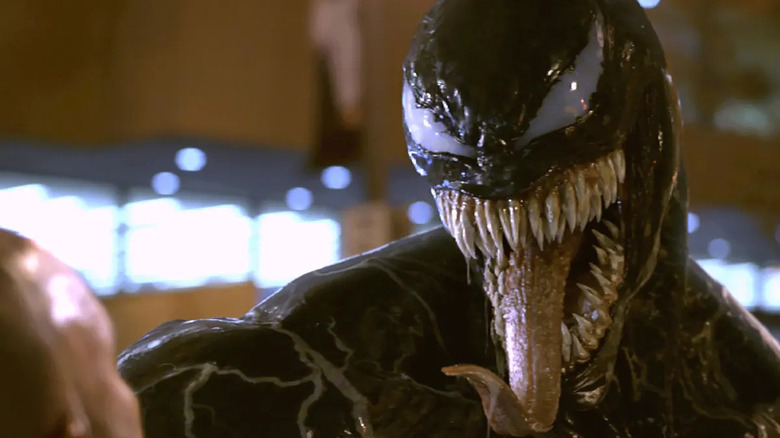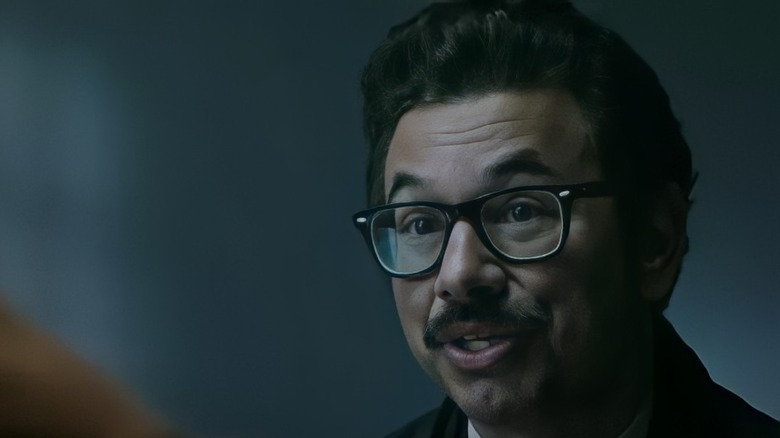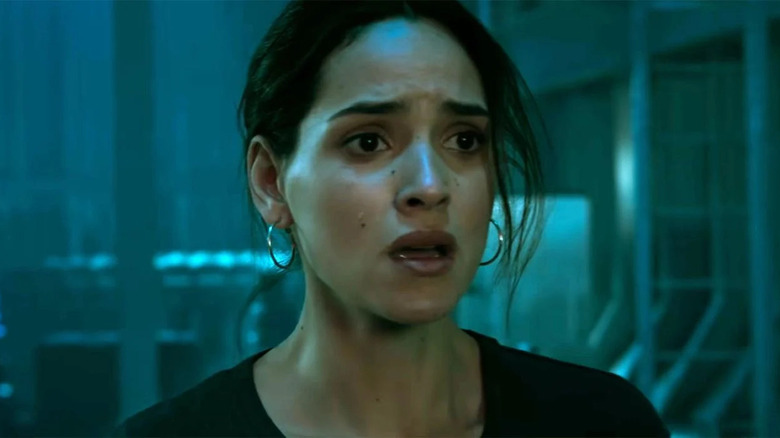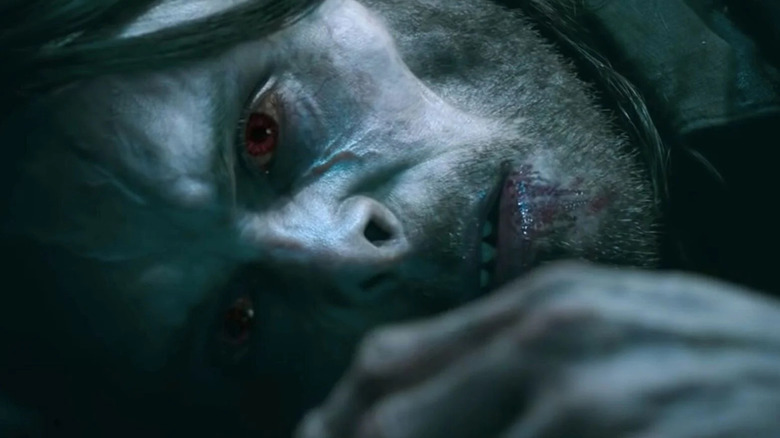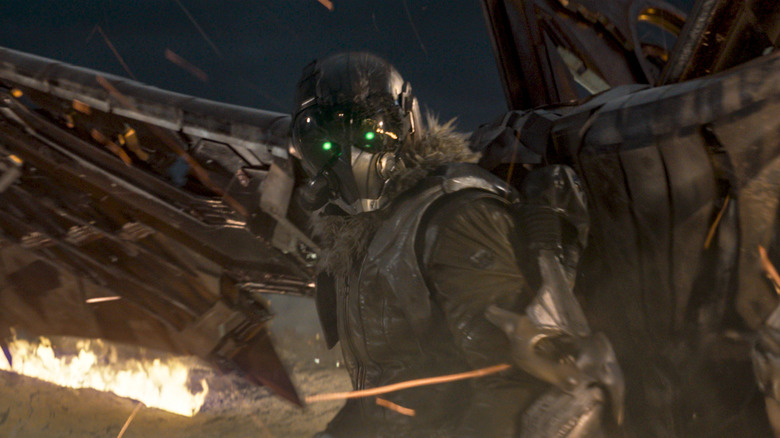The 4 Best And 4 Worst Things About Morbius
In 1965, rock legend Roy Orbison crooned, "If you can't say something nice, don't say anything at all." It's a nice sentiment. That said, Roy Orbison never saw "Morbius."
All kidding aside, Sony Pictures' pseudo-Gothic extension of its Spider-Man Universe has finally arrived in theaters, and it is worth discussing. Sifting through the various creative decisions made for the project, be they good, strange, or awful, is certainly more interesting than sitting through your average "Dracula" ripoff or reading a subpar comic. For film fans who want fascinating blockbusters, "Morbius" is the epitome of "be careful what you wish for." It is operatic, bloodless, dream-like, and corporate. No one will compare it to the year's best comic book movies, and maybe that's a good thing.
Here are the best and worst things about "Morbius."
Best: Matt Smith
Let's start with a clear winner: "Morbius" villain Matt Smith understands the assignment. He might be the only one. Daniel Espinosa's film becomes a heightened riff on Gothic Hammer Films productions whenever the 11th Doctor is on screen. As Dr. Michael Morbius' best friend Lucien — referred to throughout as Milo for reasons more confusing than "Tenet" and "Inception" combined — Smith doesn't chew the scenery so much as decide it's cardboard. He hones in on the anger of a man who has everything but his health and spins it into gold.
What does that look like? A sequence in an ornate bathroom in which Smith struts, primps, and does pushups to "EKSE" by Off The Meds; a Shakespearean confrontation between Smith and his paternal caretaker, Dr. Nicholas (Jared Harris, punching way below his weight class). Notice how those last two sentences contain references to the greatest-ever playwright and a nouveau-techno boy band? That's the "Morbius" we deserve.
In retrospect, Smith's performance provides the film with a solid blueprint: Be deadly serious until the second you can't. (And, in all fairness, it sounds like the filmmakers had this goal as well.) If there's any justice in the world, Smith won't just emerge from "Morbius" unscathed — he'll earn the movie stardom he so richly deserves.
Worst: The direction
Friends, readers, fellow critics, lend me your ears; I come to praise Daniel Espinosa, not to bury him.
Espinosa is a journeyman filmmaker. There's nothing wrong with that. Over the last decade or so, the Swedish director has flitted from genre to genre, delivering seedy crime pics like "Easy Money," standard action riffs like "Safe House," and bleak space horror flicks like "Life." None of these movies are awful. Even "Safe House," which can generously be described as "a basic cable movie," delivers one brutal, satisfying slapdown. Espinosa's best work can be found in the story's margins. He excels at foreshadowing and subverting expectations; you can see the bleak ending of "Life" coming a mile away, but the picture fools you anyway.
"Morbius" would benefit from a director that can surprise and delight, and for its first 45 minutes, Espinosa seems up to the task. He and the script, which is credited to Matt Sazama and Burk Sharpless, shake up the standard mad-scientist formula and build Morbius' world out with glee. It isn't high art, but it isn't mediocre.
Then, the second act arrives. Even if there's some sort of artistic intent behind Morbius' shadowy "Matrix"-aping CGI conflicts, the results are hard to swallow and (literally) harder to see. Espinosa's perspective doesn't disappear from the proceedings entirely, but his touch slips dramatically. It's a sad end to a promising start. Espinosa and audiences deserve better.
Best: Much of the script
I have no idea what Matt Sazama and Burk Sharpless did or didn't contribute to "Morbius." It appears that many scenes that the duo wrote wound up on the cutting room floor, and there were reports the project was rewritten by Art Marcum and Matt Holloway. Still, whoever is responsible for the film's first act deserves praise. For its first 40 minutes, "Morbius" is a convincing amalgamation of horror cliches and naturalistic drama. It doesn't reinvent the wheel, but it does trick out the car.
"Morbius" opens with a scene that would come 20 minutes into most movies. A helicopter into the jungles of Costa Rica. The man who emerges from the vehicle is a disabled man, but an intellectual polymorph. He spouts science as he slices his hand open in front of a bat cave while those around him look uneasy, and then flee in terror when bats swarm hungrily. If no one told you that this was from a superhero movie, you might mistake it for the latest Shudder exclusive.
"Morbius" takes its time before it becomes a standard comic book blockbuster. Even better, at first it feels like it's deliberately structured to avoid the genre's cliches. Whether Sazama and Sharpless, Marcum and Holloway, or Sony's executives are responsible for the flaccid scenes that tie the film into Sony's larger Spider-Man Universe, there is still plenty here worth praising.
Worst: The Venom tie-ins
It's not hard to imagine a version of "Morbius" that benefits from "Venom." Ruben Fleischer's film (and Andy Serkis's sneakily awesome follow-up) proved that audiences would show up for a movie about a Spider-Man villain that doesn't feature Spider-Man, particularly if the lead actor is allowed to act completely unhinged. Tom Hardy is doing the most as Eddie Brock — just ask the lobster tank — and Jared Leto is no stranger to extreme acting choices. "Morbius" could (and should) have been his playground.
But, even within its threadbare story, "Morbius" could've used a symbiote infusion. While characters make references to "that thing in San Francisco," there's no context for how the events of "Venom" shaped public perception. It isn't hard to imagine that a blood-sucking killer would seem less strange after parasitic blobs terrorized the Golden City. Why not address this in the story? "Morbius" takes place in New York, and there's humor to be mined from New Yorkers' reaction to vampire murderers. Better still, the new world order created by Venom, Carnage, and the like could help Michael Morbius lay low. A serial killer is less of a threat than bloodthirsty aliens on the prowl.
Instead, we get the previously mentioned quip about San Francisco and Jared Leto growling "I am Venom" to a drug dealer before pummeling him. That isn't Venom's chaotic spirit, and it's a missed opportunity.
Best: Agent Rodriguez
Agent Rodriguez (Al Madrigal) is a quip machine. Does that make you want to roll your eyes? Understandable! Quips have become inseparable from superhero films at large. Blame Marvel, blame Robert Downey Jr.'s improv skills, and blame audiences for eating it all up. Whether you like it or not, witty repertoire is now the standard. As such, it's not surprising that there are quips in "Morbius," nor that they come from a supporting character who happens to be a cop. From the noirs of old to "The Other Guys," snarky police officers are a cliche almost as old as cinema itself.
But what's nice about Agent Rodriguez and his penchant for glib asides is that they're purposeful. Rodriguez seems genuinely scared of Morbius; when he whips out holy water during their interrogation, it's not just for laughs. Rodriguez's grim observational streak allays the horror of crime scenes and charms the suspects he's grilling. His quips are a feature, not a bug. (It should be noted that none of this would work if Madrigal wasn't excellent in the role. He's worth keeping an eye on from here on out.)
Worst: The romantic subplot
"Morbius" deserves a solid romantic subplot. If the movie is truly meant to be a blend of Bram Stoker and Mary Shelley, then there should be a character that recalls Mina Harker or Elizabeth Lavenza. And, to the film's credit, Martine Bancroft (Adria Arjona) is more than a cookie-cutter character. She's witty, erudite, and tough as nails. A mid-film sequence in which she uses Spanish to quickly establish a rapport with a bodega owner and flee the police is a simple but wonderful grace note. "Morbius" ends with Martine's death and resurrection as a vampire, and one would think that genuine love and pathos preceded that story beat.
One would think.
Instead, "Morbius" crams its romantic subplot into the margins. Characters say that Martine and Morbius are close. When the audience finally sees them together, it's in a sequence that burns narrative credibility (having Martine and Morbius take a break from being chased to flirt in a very public coffee shop for minutes on end is certainly a choice). It doesn't help that Leto and Arjona have limited chemistry that is wildly overshadowed by the spark between Leto and Smith — their brotherly bond is better drawn and better acted. Martina serves as a wedge between Lucien and Morbius, but all that does is grind the film to a halt.
Ending "Morbius" with Martine's death is almost radical. It's a shame that "Morbius" can't live up to that decision.
Best: The ending
Critics have been pining for smaller-scale comic book movies for years. I support this. If superhero films are going to be the most reliable way to put butts in theater seats for the next decade-plus, filmmakers will have to find ways to vary the formula. Chloe Zhao's "Eternals" attempted to do so, but its spread of Deviants, Titans, and still-born gods was overwhelming for most audiences. We've struggled to keep track of what Earth's Mightiest Heroes are doing. Adding the entire cosmos to the MCU in addition feels like too much.
Given that, it's refreshing that "Morbius" boils down to two men fighting for their souls and little else. Even though Morbius and Lucien punch each other across the New York City skyline and into its subways, there's not much civic destruction. Lucien doesn't plot to enslave the human race. There are no doomsday machines or excessive MacGuffins. The conclusion of "Morbius" is focused, minimal, and concerned almost entirely with its characters. That's remarkably refreshing. It's disappointing that the film fails to execute its vision, but the vision is there all the same. More like this, please.
Worst: The credits scenes
"Morbius" doesn't truly earn the audience's ire until the end credits sequences. For the most part, the film isn't mediocre. Even when it fails, it's attempting to do something meaningful and new with the superhero genre. At its worst, "Morbius" feels like a corporate-driven means to make more Spider-Man-adjacent movies, and little else.
And then, in its final moments, that's what "Morbius" becomes in its entirety.
The movie's first mid-credits sequence moves Adrian Toomes — aka the Vulture, aka Michael Keaton — into Morbius' dimension. This isn't objectively awful. Keaton makes any movie better, and his Adrian Toomes is one of the best live-action Spider-Man villains. Of course Sony wants him for their cinematic universe.
But that's all it wants.
The film's second credits sequence recapitulates the first. That's dumb, but it's far from the only problem. When we last saw Toomes, he was a man of honor. He was a rogue, yes, but one principled enough to keep Peter Parker's identity a secret. Here, Toomes arrives in Morbius' world and doesn't once mention the family that matters so dearly to him. He decides to team up with Morbius, a living vampire who he has never met before, in fewer than 15 seconds.
This isn't just bad. It's character assassination. The scene is more than likely the product of last-minute rewrites and reshoots (that Vulture doesn't remove his helmet at all feels telling, as do the glimpses of Keaton that audiences got in early trailers, but which were cut for the final film), but that's no excuse for this level of tomfoolery. It's an embarrassment to the film, to Sony's Spider-Man Universe, and to comic book movies in general.
